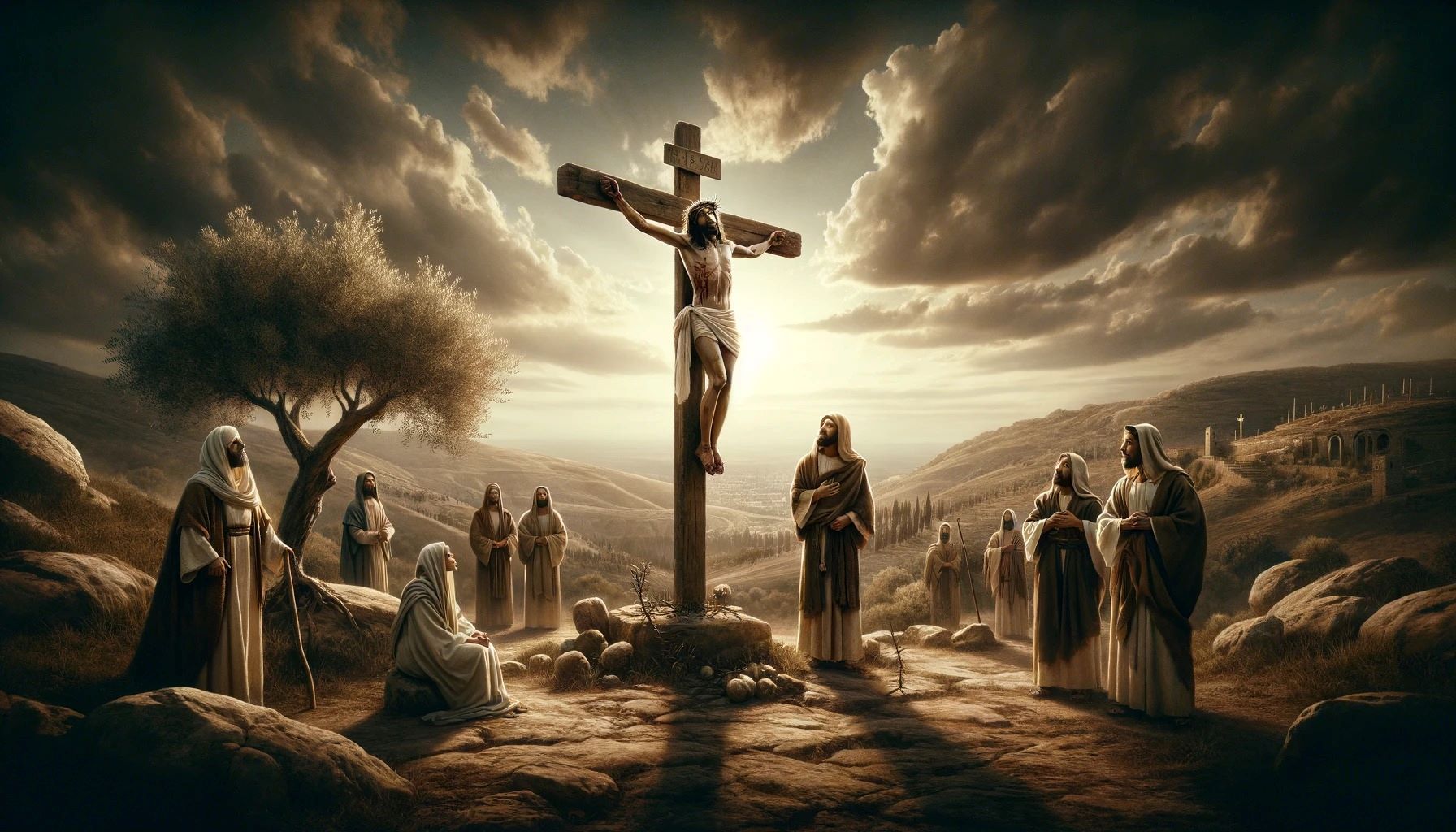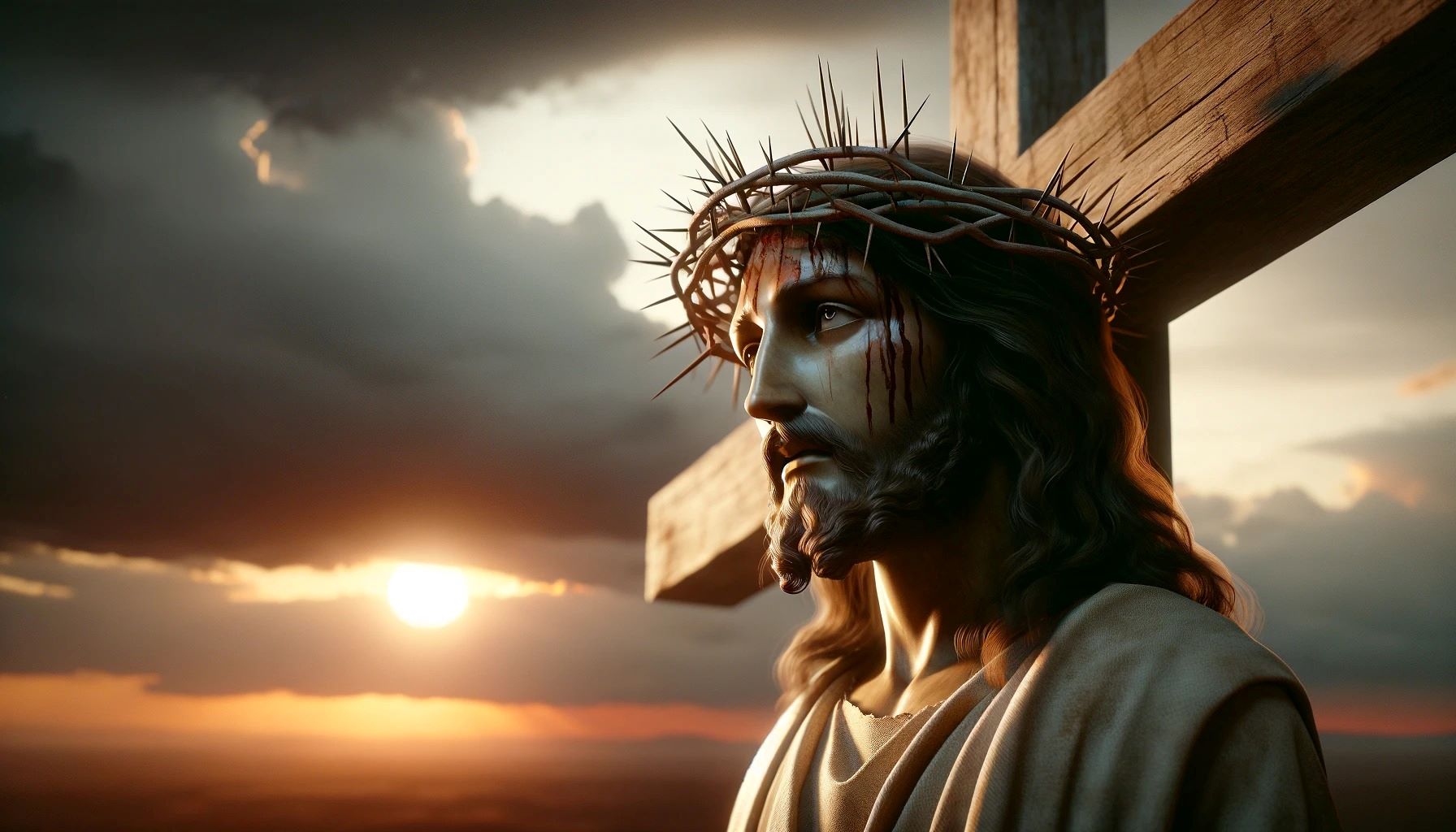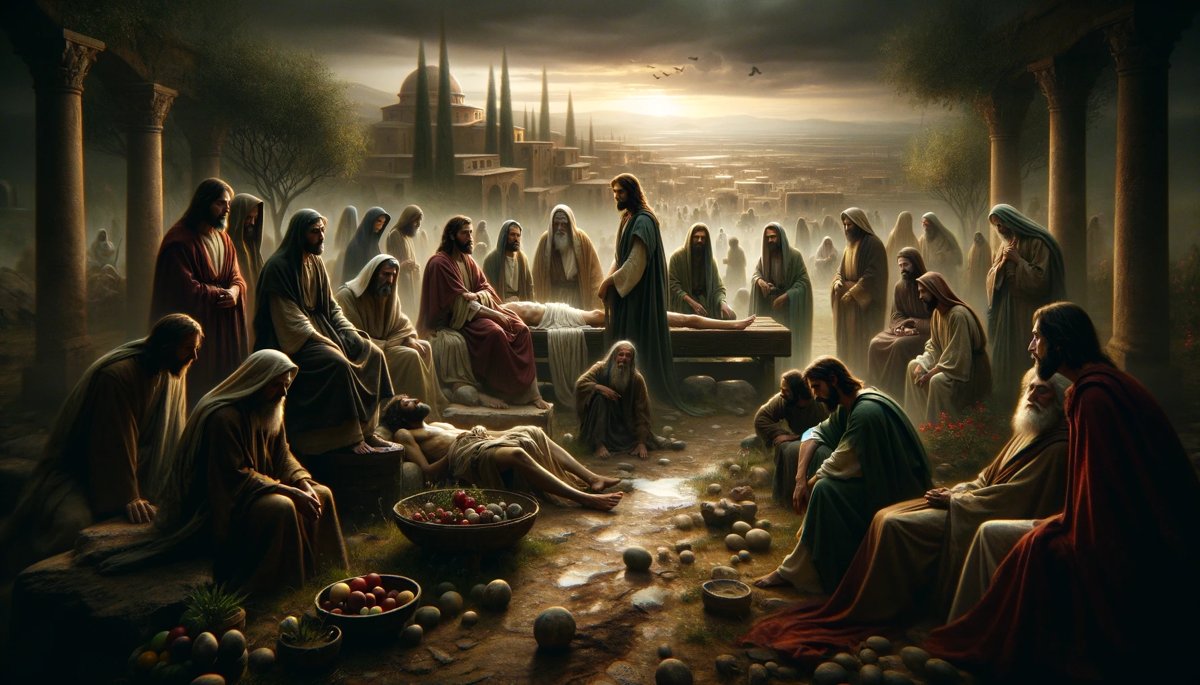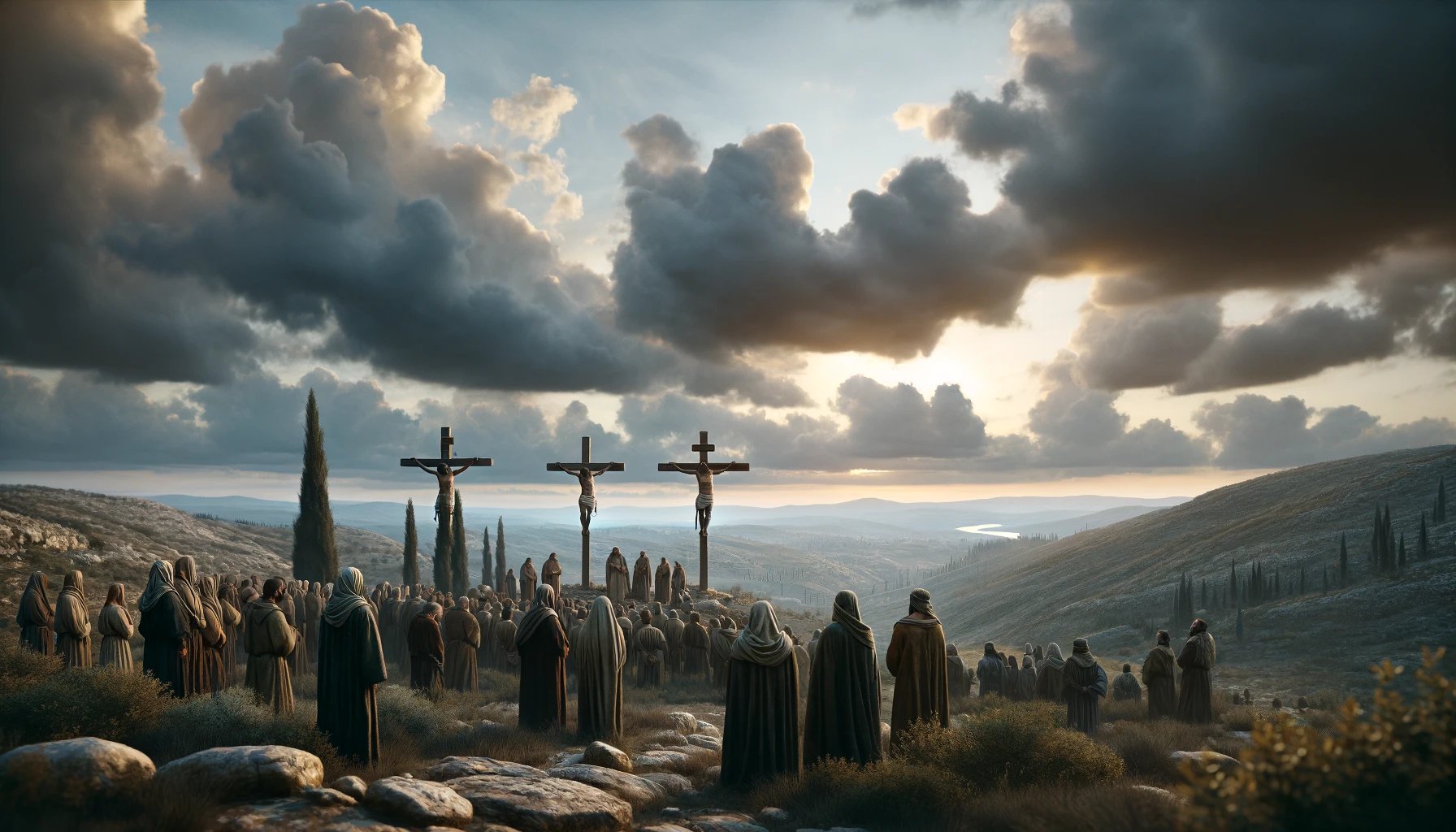Home>Christian Videos>Bible Stories>Where Did Jesus Christ Die


Bible Stories
Where Did Jesus Christ Die
Published: March 1, 2024
Peter Smith, Editorial Director at Christian.net, combines deep insights into faith, politics, and culture to lead content creation that resonates widely. Awarded for his contributions to religious discourse, he previously headed a major organization for religious communicators, enhancing dialogue on faith's societal impacts.
Discover the biblical account of where Jesus Christ died and the significance of this event in the Bible. Explore the stories and teachings related to this pivotal moment. Uncover the truth behind the location of Jesus Christ's crucifixion.
(Many of the links in this article redirect to a specific reviewed product. Your purchase of these products through affiliate links helps to generate commission for Christian.net, at no extra cost. Learn more)
Table of Contents
The Crucifixion of Jesus Christ
The crucifixion of Jesus Christ is a pivotal event in Christian theology and history. It is the central focus of the Christian faith and is believed to be the ultimate sacrifice made by Jesus for the redemption of humanity's sins. According to the New Testament of the Bible, Jesus was crucified by the Romans under the orders of Pontius Pilate, the Roman governor of Judea at the time. The crucifixion is a symbol of suffering, sacrifice, and atonement in Christianity, and it holds significant theological and spiritual importance for Christians around the world. The crucifixion of Jesus Christ is a fundamental aspect of Christian belief and is commemorated annually during the observance of Good Friday.
-
Historical Context: The crucifixion of Jesus Christ took place during the 1st century AD in the Roman province of Judea. At that time, crucifixion was a common form of execution used by the Romans for criminals and political dissidents. Jesus' crucifixion was a public event, and it is described in detail in the Gospels of Matthew, Mark, Luke, and John in the New Testament.
-
Suffering and Sacrifice: The crucifixion of Jesus Christ is depicted as a harrowing and agonizing ordeal. According to the biblical accounts, Jesus was betrayed, arrested, and subjected to a series of trials before being sentenced to death by crucifixion. The physical and emotional suffering endured by Jesus during the crucifixion is a central theme in Christian theology, emphasizing the depth of his sacrifice for the salvation of humanity.
-
Redemption and Atonement: In Christian belief, the crucifixion of Jesus Christ is seen as the ultimate act of love and redemption. It is believed that through his death on the cross, Jesus atoned for the sins of humanity, offering the promise of salvation and eternal life to those who believe in him. The crucifixion is viewed as a profound demonstration of God's grace and mercy towards humanity.
-
Symbolism and Spiritual Significance: The crucifixion of Jesus Christ holds deep symbolic and spiritual significance for Christians. It is a reminder of the suffering endured by Jesus and the profound love that God has for humanity. The image of the crucifix, depicting Jesus on the cross, is a powerful symbol of faith, hope, and the triumph of good over evil in Christian tradition.
The crucifixion of Jesus Christ is a foundational aspect of Christian faith and theology, representing the ultimate sacrifice and atonement for the sins of humanity. It is a profound and deeply meaningful event that continues to shape the beliefs and practices of Christians worldwide.
Read more: Why Did Jesus Christ Die
The Location of Jesus Christ's Death
-
Historical Accounts: The location of Jesus Christ's death is a topic of historical and theological significance. According to the New Testament, Jesus was crucified at a place called Golgotha, which means "the place of the skull" in Aramaic. This location is commonly associated with a hill outside the walls of Jerusalem. The Gospels of Matthew, Mark, and John all mention Golgotha as the site of Jesus' crucifixion, while the Gospel of Luke refers to the place as "the Skull."
-
Biblical References: The biblical accounts provide specific details about the location of Jesus Christ's death. They describe Golgotha as a place near the city where Jesus was led to be crucified. The significance of this location is deeply rooted in Christian tradition and has been the subject of historical and archaeological research.
-
Archaeological Investigations: Over the centuries, numerous efforts have been made to identify the exact location of Golgotha and the site of Jesus' crucifixion. Archaeological excavations and studies have sought to uncover evidence that could shed light on the historical and geographical context of Jesus' death. While there is ongoing debate and differing opinions among scholars, the quest to pinpoint the precise location continues to be a subject of interest and inquiry.
-
Religious Pilgrimage: The location of Jesus Christ's death holds immense religious significance for Christians worldwide. The site traditionally identified as Golgotha is now encompassed within the Church of the Holy Sepulchre in Jerusalem. This revered place has become a focal point for Christian pilgrimage and devotion, attracting believers from various denominations who seek to connect with the profound spiritual and historical legacy of Jesus' crucifixion.
-
Symbolic Meaning: Beyond its geographical and historical importance, the location of Jesus Christ's death carries deep symbolic meaning for Christians. It represents the physical and spiritual intersection of suffering, redemption, and divine love. The significance of Golgotha extends beyond its physical coordinates, serving as a powerful symbol of the central tenets of the Christian faith and the enduring impact of Jesus' sacrificial death.
-
Continued Reverence: The location of Jesus Christ's death continues to be a source of reverence, contemplation, and spiritual connection for Christians. Whether through scholarly exploration, religious pilgrimage, or personal reflection, the quest to understand and honor the place of Jesus' crucifixion remains an integral part of Christian faith and devotion.
The location of Jesus Christ's death, traditionally associated with Golgotha, holds profound historical, religious, and symbolic significance within Christian theology and tradition. It serves as a focal point for contemplation, pilgrimage, and spiritual connection, embodying the enduring impact of Jesus' crucifixion on the beliefs and practices of Christians worldwide.
Theories and Debates Surrounding Jesus Christ's Death
-
Historical Controversies: The death of Jesus Christ has sparked numerous theories and debates throughout history. One of the most contentious issues revolves around the circumstances and significance of his crucifixion. Scholars, theologians, and historians have engaged in extensive discussions and analyses to unravel the complexities surrounding Jesus' death, leading to a diverse array of theories and interpretations.
-
Soteriological Perspectives: One prominent area of debate pertains to the theological implications of Jesus' death. Different Christian denominations and theologians hold varying perspectives on the atoning nature of Jesus' crucifixion. Theories such as penal substitution, moral influence, and ransom theory have sparked considerable debate regarding the purpose and effects of Jesus' sacrificial death, reflecting the diverse theological landscape within Christianity.
-
Historical Context and Interpretations: The historical context of Jesus' death has also been a subject of intense scrutiny and debate. Scholars have delved into ancient texts, archaeological evidence, and cultural practices of the time to construct nuanced interpretations of the events leading to Jesus' crucifixion. The quest to reconcile historical accounts with theological narratives has given rise to multifaceted theories that seek to shed light on the socio-political, religious, and cultural dynamics surrounding Jesus' death.
-
Alternative Explanations and Skeptical Inquiries: Beyond theological and historical perspectives, there exist alternative theories and skeptical inquiries regarding Jesus' death. Some scholars have proposed alternative scenarios, questioning the traditional accounts of Jesus' crucifixion and exploring hypotheses that challenge established beliefs. These alternative theories, while often controversial, contribute to the ongoing discourse and critical examination of the events surrounding Jesus' death.
-
Interdisciplinary Dialogues: The study of Jesus' death extends beyond theological and historical realms, encompassing interdisciplinary dialogues that intersect with fields such as psychology, literature, and philosophy. These diverse perspectives have engendered debates on the psychological impact of Jesus' crucifixion, the literary representations of his death, and the philosophical implications of his sacrificial atonement, adding layers of complexity to the ongoing discussions surrounding Jesus' death.
-
Contemporary Relevance and Interpretive Diversity: In contemporary times, the debates surrounding Jesus' death continue to evolve, reflecting the dynamic nature of theological inquiry and scholarly discourse. The diversity of interpretations, theories, and debates surrounding Jesus' death underscores the enduring significance of this pivotal event, serving as a catalyst for ongoing reflection, inquiry, and dialogue within religious and academic circles.
The theories and debates surrounding Jesus Christ's death encompass a wide spectrum of perspectives, interpretations, and inquiries that reflect the enduring complexity and significance of this pivotal event in Christian theology and history. The diverse array of theories and debates underscores the multifaceted nature of scholarly inquiry and theological reflection, contributing to ongoing discussions that enrich our understanding of Jesus' crucifixion and its profound implications.
Historical and Biblical Accounts of Jesus Christ's Death
The historical and biblical accounts of Jesus Christ's death provide a detailed narrative of the events leading to his crucifixion and the profound significance attributed to this pivotal moment in Christian theology. The New Testament Gospels of Matthew, Mark, Luke, and John offer distinct yet complementary perspectives on the circumstances surrounding Jesus' death, presenting a rich tapestry of historical and theological insights.
Gospel of Matthew
The Gospel of Matthew portrays Jesus' crucifixion as a culmination of the divine plan for salvation, emphasizing the fulfillment of Old Testament prophecies and the redemptive purpose of his sacrificial death. The narrative highlights the trial before Pontius Pilate, the mocking of Jesus, and the events leading to his crucifixion at Golgotha. Matthew's account underscores the theological significance of Jesus' death as a pivotal moment in God's redemptive mission for humanity.
Read more: How Did Jesus Christ Die?
Gospel of Mark
Mark's Gospel offers a vivid and poignant portrayal of Jesus' suffering and crucifixion, depicting the profound anguish and abandonment experienced by Jesus on the cross. The narrative emphasizes the physical and emotional torment endured by Jesus, conveying the depth of his sacrificial love and the transformative impact of his death. Mark's account illuminates the human and divine dimensions of Jesus' crucifixion, underscoring its central role in the Christian narrative of redemption.
Gospel of Luke
Luke's Gospel provides a nuanced and compassionate depiction of Jesus' crucifixion, emphasizing themes of forgiveness, compassion, and the universal scope of God's redemptive plan. The narrative includes the poignant exchange between Jesus and the repentant criminal on the cross, illustrating the message of divine mercy and the inclusive nature of Jesus' atoning sacrifice. Luke's account accentuates the transformative power of Jesus' death and its profound implications for all humanity.
Gospel of John
The Gospel of John presents a theological and symbolic interpretation of Jesus' crucifixion, emphasizing the divine purpose and cosmic significance of his sacrificial death. John's narrative highlights Jesus' regal authority even in the midst of his suffering, portraying the crucifixion as a manifestation of God's redemptive love and the fulfillment of Jesus' mission. The account in John's Gospel underscores the profound theological implications of Jesus' death as a transformative act of divine love and atonement.
The historical and biblical accounts of Jesus Christ's death in the Gospels provide a multifaceted portrayal of the events leading to his crucifixion and the theological significance attributed to this pivotal moment in Christian faith. These narratives offer profound insights into the redemptive purpose, transformative power, and enduring significance of Jesus' sacrificial death, shaping the beliefs and practices of Christians throughout history.
The Significance of Jesus Christ's Death
-
Redemption and Atonement: The death of Jesus Christ holds immense significance in the Christian faith as it is viewed as the ultimate act of redemption and atonement for the sins of humanity. According to Christian belief, Jesus willingly sacrificed himself on the cross to offer salvation and reconciliation with God, providing a pathway for humanity to be forgiven and restored to a harmonious relationship with the divine.
-
Demonstration of Love and Grace: Jesus' death on the cross is regarded as a profound demonstration of God's love and grace towards humanity. It is seen as a selfless act of divine compassion, illustrating the depth of God's care and concern for humanity's spiritual well-being. The sacrificial nature of Jesus' death is viewed as a testament to the boundless love and mercy of God, offering hope and reassurance to believers.
-
Victory Over Sin and Death: The death of Jesus Christ is interpreted as a triumph over sin and death, signifying the defeat of evil and the restoration of spiritual life. In Christian theology, the resurrection of Jesus following his crucifixion is seen as a powerful affirmation of his victory over the forces of darkness, granting believers the assurance of eternal life and the promise of overcoming spiritual death through faith in Christ.
-
Foundation of Christian Faith: The significance of Jesus' death lies at the core of Christian faith, serving as the foundational belief that shapes the theological framework of Christianity. The crucifixion is central to the Christian narrative of salvation, providing the basis for the belief in the forgiveness of sins, the hope of resurrection, and the assurance of eternal life through faith in Jesus Christ.
-
Inspiration for Compassion and Sacrificial Love: Jesus' sacrificial death serves as an inspiration for compassion, selflessness, and sacrificial love within the Christian community. It is held up as a model of unconditional love and willingness to endure suffering for the well-being of others, encouraging believers to embody the same spirit of love and service in their interactions with others and in their devotion to God.
-
Eternal Significance and Spiritual Renewal: The significance of Jesus' death extends beyond historical and temporal dimensions, carrying eternal implications for the spiritual renewal and transformation of individuals. It is believed to have a lasting impact on the lives of believers, offering the promise of spiritual rebirth, inner renewal, and the assurance of divine grace that transcends earthly existence.
The significance of Jesus Christ's death encompasses profound theological, spiritual, and ethical dimensions within the Christian faith, shaping the beliefs, practices, and worldview of believers and serving as a source of inspiration, hope, and assurance in the face of life's challenges and uncertainties.














